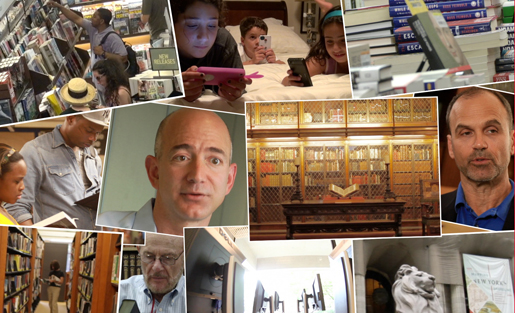
Baseball's Active Leaders, 2023
What Trump Said When About COVID
Recent Reviews
Everything Everywhere All at Once (2022)
Black Panther: Wakanda Forever (2022)
Doctor Strange in the Multiverse of Madness (2022)
Spider-Man: No Way Home (2021)
The Cagneys
A Midsummer Night's Dream (1935)
Something to Sing About (1937)
Angels with Dirty Faces (1938)
A Lion Is In the Streets (1953)
Man of a Thousand Faces (1957)
Never Steal Anything Small (1959)
Shake Hands With the Devil (1959)
Out of Print (2013)
WARNING: SPOILERS
“Out of Print” is a documentary about the shift from the printing press to this. It’s not a small shift. So many areas are involved—historical, cultural, sociological, economic, legal, neurophysiological—it would require a series of documentaries to do them right. “Out of Print” is 55 minutes long. It’s the CliffsNotes version of the topic.
Remember CliffsNotes? Dull synopses of great works of literature for students too lazy to read the book. Now students are too lazy to read CliffsNotes. Now they go to websites and cut-and-paste. Maybe they come here. Hey you. Stop that. Stop, I said.
Cui bono?
From the birth of a written language, possibly in Mesopotamia, to scrolls in 3,000 BC, to codices around the time of Christ, to Gutenberg and mechanical movable type in the 15th century, to the creation of public libraries in the 17th century, to Alexander Carnegie’s gift of public libraries across the U.S. in the early part of the 20th century, the flow of information through a visual representation of language has gotten easier and easier. Now we’ve gone digital. Now we’re all here. Welcome.
As a writer, I’m interested in the economics of this shift. If anyone can write, anyone does. If it’s all out there for free, how does anyone get paid? By singing his didn’t? By dancing his did? (Confused? Visit your local library. Kidding. Google: e.e. cummings.)
As the ground is shifting beneath us, a few are making a mint (Google, Bezos) while the majority are struggling to survive (writers, photographers, libraries, bookstores). This gets a big ho-hum from most. It’s the way of the world, they say. A new technology comes in and wipes out the old professions. We’re all cutters now.
Johnny can’t analyze
But beyond economics, beyond copyright issues and pirating, beyond the digitizing of libraries and the fear of Google and Bezos and where will our libraries and bookstores be in 10 or 20 years (if they be), the biggest issue the doc raises, for me, is this: What is it doing to us? If books are the foundation of civilization, if Gutenberg led to the Renaissance, what is this leading us to?
Kids average 7.5 hours a day in front of screens? What does that mean?
They don’t go to the library to look things up anymore? They just Google it? No duh. But what does that mean? And what is lost? And what—since you can’t Google everything, since everything isn’t under the umbrella of Google yet—are they missing? What are we all missing?
If everything’s easy to find, where’s the joy in finding it? Watching this doc, I flashed back to articles I wrote in the 1990s, and the research I did at the various libraries at the University of Washington, and the nuggets I pulled out. For an article on David Horsey, the 1999 Pulitzer Prize-winner for editorial cartooning, I found his early editorial cartoons for The Daily, the University of Washington school newspaper, and it led to this paragraph in the final piece:
Horsey was so successful at the UW Daily that by 1972 they were printing “The Best of Horsey” in their pages; they also interviewed him in the in-bred fashion of college newspapers. Photographs show Horsey bedecked in tight turtleneck, love beads, and, one imagines, hopeless idealism. In a comment that causes the adult Horsey to roar with laughter, for example, his younger self opined, “I can’t see myself spending my life in an office. ... I don’t want to be working for a bunch of fat old men in an office all day long.”
The concern isn’t that Johnny can’t read but can’t analyze. He just extracts data. They all do. The documentary includes a story about a 7th-grade class reading a website about the Pacific Northwest Tree Octopus, and the different ways to save it, and everyone believed it. I was reminded of a recent incident in which a friend, in her 20s, told me that Justice Scalia was retiring. For a second, my hopes were raised. Then I went, “Wait, where did you get this? The New Yorker site? Andy Borowitz?” I shook my head.
On the other hand, I certainly know one kid who’s good with critical thinking. Is he an anomaly? Does it help that he reads big books all the way through?
Hunt and peck
That’s another of the pervasive fears in the doc. In the Internet age, we’re distracted and nibble at bits of information and move on. We visit Facebook and Twitter three times a day, five times, 10 times. We don’t meditate enough with one big, slow source of information: a book. We hunt and peck at the computer screen and come away hungrier than ever.
Unfortunately, that’s what “Out of Print” is like, too. It’s no slow meditation. It hunts and pecks after little bits of information and tosses them to us and we gobble them. But we come away hungry. Worse, it tries to end on a up-note (the children are our future), but, given everything that’s come before, it’s a false up-note. The director, Vivienne Roumani, is a former librarian who now does this. A testimonial might have been interesting.
Here’s my testimonial. For most of my adult life, whenever I found a writer I liked, I tried to read their entire oeuvre. I did this with many writers: Salinger, Irving, Vonnegut, Roth, Doctorow, Morrison, Tolstoy, Baldwin, Updike, Kundera, Mailer. I still think of myself as the kind of person who does this but my last such author was Tobias Wolff in 1997. Since then I’ve read fewer and fewer books, less and less fiction. Maybe I haven’t found the right author. Maybe they’re not publishing the right authors. Or maybe 1997 is the year I got my first dial-up account and went online.

—May 21, 2013
© 2013 Erik Lundegaard







